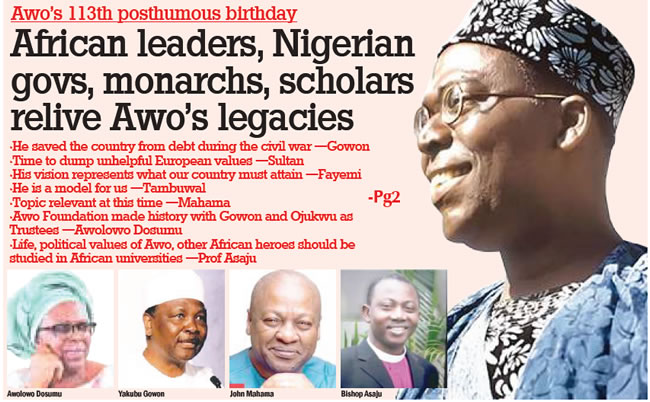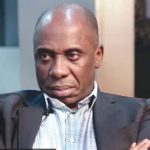THE memory of Chief Obafemi Awolowo resonated across Africa and beyond on Sunday as he posthumously clocked 113 years.
Continental leaders, including the 36 state governors, paid deserving tributes to the legacy of honesty, courage of conviction, sacrificial service to humanity, inspirational leadership and insightful administrative capacity that he left behind, following his death 35 years back.
Over 600 personalities from South Africa, Ghana, Canada, the United Kingdom, United States of America, Nigeria and various parts of the world, converged, via Zoom, on Sunday, for a lecture to commemorate the 30th anniversary of the Obafemi Awolowo Foundation.
About 10 minutes into the event which began at exactly 6.00 p.m., about 300 participants had logged in to include former president of South Africa, Thabo Mbeki and his wife, Zanele; Registrar, Joint Admission and Matriculations Board (JAMB), Professor Ishaq Oloyede; Group Managing Director/Chief Executive Officer, Odu’a Investment Company Limited, Mr Adewale Raji; the Obi of Onitsha, Igwe Nnaemeka Achebe; the Sultan of Sokoto, Muhammadu Sa’ad Abubakar; the Akarigbo of Remoland, Oba Babatunde Ajayi; the Orangun of Oke-Ila, Oba Adedokun Abolarin; the Oluwo of Iwoland, Oba Abdulrasheed Akanbi and the Aare Onakakanfo of Yorubaland, Iba Gani Adams.
Also participating are Afenifere leader, Pa Ayo Adebanjo; Minister of State for Health, Dr Olorunnimbe Mamora; former Minister of External Affairs, Professor Bolaji Akinyemi; former Secretary General of National Democratic Coalition (NADECO), Mr Ayo Opadokun; Afenifere chieftain, Mogaji Gboyega Adejumo; Chief Tokunbo Ajasin; Christy Ade- Ajayi; Professor Duro Oni; former Head of Civil Service of the Federation, Professor Oladapo Afolabi; former Vice Chancellor, University of Ibadan, Professor A.B.O.O. Oyediran; former deputy governor of Ogun State, Senator Adegbenga Kaka; Chief (Ms) Tolu Ighodalo and the Director- General, Development Agenda for Western Nigeria (DAWN) Commission, Mr Seye Oyeleye.
Among many who gave inputs lauding the cherished values and ideals of Awolowo were the Sultan of Sokoto, Alhaji Abubakar; Chairman, Nigeria Governors’ Forum and Ekiti State governor, Dr Kayode Fayemi; Governor Aminu Tambuwal of Sokoto State; former Ondo State governor, Dr Olusegun Mimiko and the Obi of Onitsha, Igwe Achebe.
Others who joined were Minister of Interior, Rauf Aregbesola; Vice Chancellor, Obafemi Awolowo University (OAU), Ile-Ife, Professor Eyitope Ogunbodede; former Vice Chancellor, OAU, Professor Bamitale Omole; Professor Mobolaji Aluko; Mr Mike Awoyinfa; Ambassador Dapo Fafowora; Mr Kingsley Moghalu; Dr (Mrs) Beatrice Obiageli; Chief Tola Adeniyi; Mr Bolaji Ogunseye and the Publisher, Alaroye Magazine, Mr Alao Adedayo.
Also in attendance were a former Permanent Secretary at the Federal Ministry of Youth Development, Professor Tunji Olaopa; son of former Ondo State governor, Mr Tokunbo Ajasin; veteran singer, Onyeka Onwenu; Director-General, National Agency for Food and Drug Administration and Control (NAFDAC), Professor Mojisola Adeyeye; renown virologist, Professor Oyewale Tomori; Chief Olabode Oseni; Dr (Mrs) Jayne Shoboiki; Mrs Ayotola Ayodeji; Mrs Yemisi Subair; Chief Tolu Ighodalo; Asiwaju Solomon Onafowokan; Dr Charles Ngeribara; Dr Buro Ndu; Dr Ezekiel Adeyi; Dr Osahon Enabulele; Chief Deji Osibogun; Dr Akin Awofolaju; Chief S. O. Shonekan; Professor Wale Adebanwi; Dr Tony Marinho; Professor Akin Osuntokun; Pastor Ituah Ighodalo and DrEbenezer Obadare.
Leading the tributes at the event put together by the Obafemi Awolowo Foundation was a former president of Ghana, John Mahama, who chaired the occasion. While reiterating that Nigeria and Ghana are brothers, he pointed out that Ghana’s independence anniversary coincided with the birthday of the sage.
He spoke on the current challenges of the African continent, noting that it was fortuitous that the Foundation chose this time to discuss ‘Values for Africa’s Development’, the theme for the annual lecture. Executive Secretary of the Foundation, Ambassador Dr Tokunbo Awolowo Dosumu, in her welcome address, recalled the early days of the body and how the idea was received by Nigerians across ethnic divides and religious persuasions.
“Chief Obafemi Awolowo was, first and foremost, a thinker. He is generally acknowledged to have brought outstanding erudition and critical analysis to bear on the art of governance. It could even be argued that partisan politics was, for him, but an avenue to attain that necessary vantage position from which he could assist his country and her peoples to reach the immense heights that he was convinced was their manifest destiny.
“For these and many other reasons, including the need to sustain this core essence of Awo’s legacy and, hopefully, protect it from the vagaries of partisan politics, it was evident that an institution in his memory would better provide the scholarly and systematic avenue through which we could accomplish our goal,” she noted.
She explained further; “This, then, was the vision that gave birth to the Obafemi Awolowo Foundation 30 years ago. The Foundation was eventually launched in Ibadan on April 11, 1992 at a ceremony, the outcome of which was so encouraging that it dispelled all our previous fears regarding the viability of its take-off. Subsequently, inclusiveness has remained the Foundation’s watchword, from membership of the various governance structures and committees of the foundation to the choice of resource persons for our various programmes. “Indeed, I believe that the Obafemi Awolowo Foundation made history with the appointment of General Gowon as chairman of the Board of Trustees whose membership included Lieutenant-Colonel (Ikemba) Odumegwu Ojukwu.
“In our audacity, we simply identified twenty-seven of the most eminent Nigerians and sent them letters of appointment. What we found most surprising, but instructive, was the fact that not a single one of them declined our appointment.
“The Obafemi Awolowo Foundation story is a testament to the awesome power and infinite endurance of goodwill. 30 years on, we continue to draw from the seemingly inexhaustible supply of goodwill left behind by Chief Awolowo.
“This explains why we have been able, over the years, to attract the brightest and best minds as organising committee members, resource persons and participants at all our programmes at little or no cost to the Foundation. It is, for me, a source of unceasing wonder to observe just how ready and willing people have been, and still are, to identify with, and support the Foundation’s work.
“It was never going to be easy to sustain a Foundation that was set up in memory of the sage, Chief Obafemi Awolowo. Maintaining credibility will always be a tasking feat. However, constant focus on the absolute imperative of living up to the high standard for which the legacy is renowned, the expectation of Awo’s teeming admirers and our own self-appointed mandate, has helped us tremendously.” Nigeria’s former head of state, General Yakubu Gowon, said Awolowo demonstrated transformational leadership is not a rocket science.
Gowon also recalled how Awo saved the country from debt during the civil war as federal commissioner for finance, adding he was a strong believer in the unity of Nigeria. “Chief Awolowo demonstrated transformational leadership is no rocket science.
This has made him relevant in the history of the country considering the monumental development he achieved as Premier of the Western Region. “As a politician, legal luminary and elder-statesman, he is relevant in the history of mankind. His good works stand as a standard of reference in our organisation. He established the first broadcasting television in Nigeria.
He made free education and healthcare compulsory as the leader in the Western Region as at that time,” the retired General said.
In his goodwill message, the Sultan of Sokoto, called for a new nationalism in Africa, saying it is time to dump needless eurocentrism.
He said, “We need to study about the African values that built these polities and their economies. We must also remember that a lot of the European values have no roots in our tradition and religions and even for sustainability, we need to build on those African values that motivated and inspired our development. “It is, therefore, both pleasing and relieving to see that this discussion is taking place at a time when there is pressure on Africa to develop.
Nigeria, for its size and its history, must lead this development of Africa. And as we have seen in other societies, development starts with a mind-set shaped by values, which are both indigenous and dynamic.
“Development must be sustainable and to be sustainable it must be anchored in values that are indigenous. This will require us to come back to our roots and prioritise those values that can inspire and motivate development. Of course there are values that are universal, but even universal values require local anchors which will give them meaning and traction. It is much easier to build on what we have than to try grafting foreign values on local psyche which have no roots in our cultural soil.”
Nigeria’s 36 state governors also spoke of the governance legacy bequeathed their generation by Chief Awolowo.
Governor Fayemi, noted on behalf of his colleague-governors, that the ideals and vision of Awolowo as the leader of the Western Region remain governance inspiration in the country.
He added that “his focus on literacy, health care services among others in the Western Region now represent what our country must attain, for a united and more prosperous nation, in honour of his memory.”
Governor Tambuwal, in his brief remark, paid tributes to what Awo stood for and still stands for, while encouraging the Foundation to soldier on with the commendable work. Governor Mimiko stressed that Awo’s legacy is a lesson “for us on values that endure and the contemporary relevance. The Obi of Onitsha called for the restoration of communal values.
“The theme of this year’s lecture resonates very well with me in my efforts to transform my kingdom of Onitsha from an ancient enclave that basked in past glories to a forward- looking community that is 21st century compliant. “On becoming monarch, I met a dysfunctional community still affected by the aftermaths of the civil war. Firstly, we embarked on a journey of peace building and reconciliation, believing that these were adequate for the social re-engineering that we envisaged. Subsequently, we realised that there was a far more fundamental enabler to our journey of sustainable development, namely, restoring our communal values, that were sorely distorted by the civil war. “We have since infused the concept of values re-orientation into every facet of our comprehensive programmes for our youths under four business pillars and four enablers. “It is not yet Uhuru but our progress to date is very satisfying,” he said.






